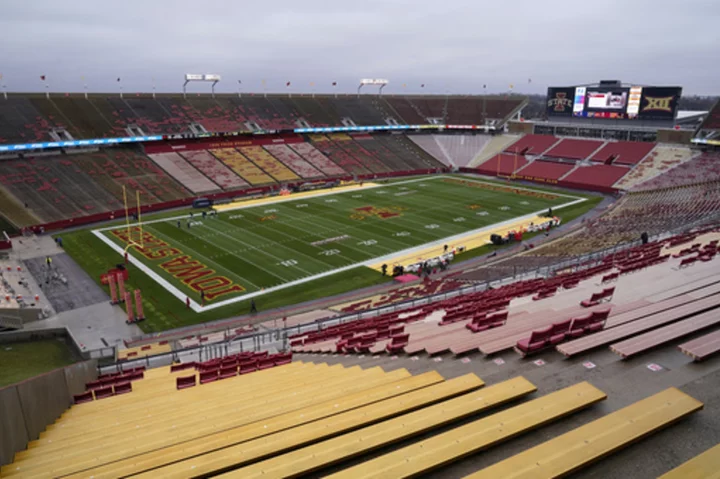More than 40 athletes from Iowa and Iowa State could be facing discipline from both law enforcement and the NCAA for impermissible online wagering.
The NCAA consequences could be far worse than the legal ones.
While the penalty for betting on sporting events in the state of Iowa for individuals under the age of 21 is a fine of $645, a college athlete could be sidelined for most of a season because of NCAA rules.
Five years since a Supreme Court decision paved the way for states to legalize betting on sporting events, more than half have done so. As legal gambling on games has become pervasive, NCAA rules prohibiting it remain strict and college sports leaders are cautious about dialing them back.
Tulane athletic director Troy Dannen said decision-makers should always be open to modernizing NCAA bylaws to reflect changing societal norms. He cited how marijuana-usage rules were relaxed to reflect more permissive laws in recent years.
“But the fact that it’s legal doesn’t mean it should be acceptable if you are a student-athlete," he said.
Earlier this week, Iowa and Iowa State acknowledged they are cooperating with both local gaming regulators, law enforcement and the NCAA after in an investigation of gambling activities revealed potential involvement by athletes in multiple sports.
That came on the heels of Alabama firing its baseball coach amid an investigation by gaming authorities of suspicious bets placed in Ohio on one of its team's games.
In the Alabama case, no athletes are suspected to be involved. In the Iowa case, some Hawkeyes baseball players have already been sidelined from competition, which is routine when a school believes the eligibility of an athlete may have been compromised.
The Iowa director of gaming told The Associated Press earlier this week that no evidence indicates match fixing or suspicious wagering activity in games involving the Hawkeyes or Cyclones.
NCAA rules prohibit athletes, coaches and staff from betting on sports in which the NCAA conducts a championship. For example, athletes aren’t allowed to legally place bets on NFL or games or pro golf. Even participation in a March Madness bracket pool with stakes is prohibited.
College athletes can bet on horse racing where it is legal and gamble in casinos if they are of legal age, but NCAA rules against legal wagering are stricter than most professional leagues. The appetite to ease them might be low.
“It would be a major mistake to change NCAA rules regarding gambling if it negatively impacts the integrity of games,” Atlantic Coast Conference Commissioner Jim Phillips told AP via text message.
Dannen said he had not seen anything introduced in the governance process that would loosen the NCAA rules, while Ohio athletic director Julie Cromer had a simple summation.
“It’s different to be a competitor than to be a consumer of sports,” said Cromer, who co-chaired the NCAA’s Division I transformation committee last year.
The most high-profile recent case involving an athlete being punished for otherwise legal gambling came last year at Virginia Tech. Football player Alan Tisdale was suspended six games — half a season — for betting on NBA games. Tisdale self-reported the bets to Virginia Tech officials, and initially received a nine-game suspension from the NCAA before it was reduced after a Virginia Tech appeal.
Iowa State said football players, wrestlers and track and field athletes were among the 15 identified in the state's probe. Iowa said it had received information about 26 athletes from baseball, football, wrestling, men’s basketball and men’s track and field teams.
The Hawkeyes and Cyclones play their annual football rivalry on Sept. 9 so any NCAA discipline handed down to players on those teams is likely to impact that game.
The twin gambling scandals come at a time when college sports and the NCAA are in a tumultuous period of transition, facing legal and political pressure over how athletes can be treated and compensated.
Modernization has been a buzzword among administrators as the NCAA looks to reform its outdated amateurism model and deregulate.
But making it more permissible for athletes to legally wager doesn't fall under the umbrella of athlete benefits, said Dannen, who was also a member of the D-I transformation committee.
“Because there is a scandal or two should we change the rules to permit what is currently scandalous?" he said. “That doesn't seem to be the right reason to change a rule.”
Even as college sports conferences and schools explore ways to tap into the potential new revenue sources tied to legal wagering, leaders don't see much benefit to less stringent rules.
“I would side on continuing to have very strict and punitive NCAA bylaws,” Mountain West Commissioner Gloria Nevarez. "Because what is the upside to allowing sports wagering? Go bet the ponies. Go play blackjack."
___
Follow Ralph D. Russo at https://twitter.com/ralphDrussoAP and listen at http://www.appodcasts.com
___
AP college sports: https://apnews.com/hub/college-sports and https://twitter.com/AP_Top25

